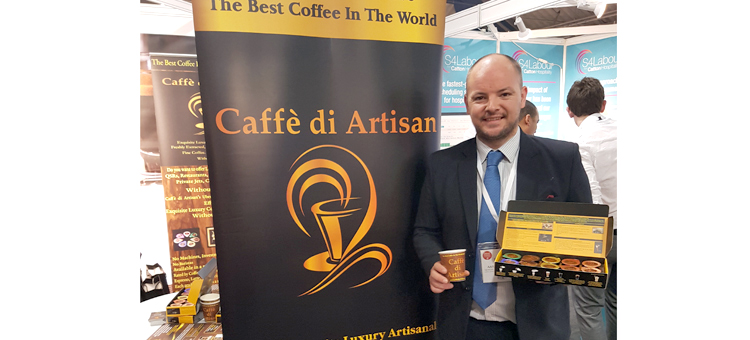By Rudy & Marlene Otter
London: Coffee beans sourced from southern Indian states of Kerala, Karnataka and Tamil Nadu attracted a great deal of attention at a major annual food and drink event here. The bustling 2-day trade show, which concluded here at the Business Design Centre on February 22, featured over 200 exhibitors, including Caffe di Artisan, a UK-based coffee company that is winning friends and influencing taste buds across the world. Its senior sales executive, Aaron Cairns and his assistant were busy dealing with swarms of enquirers when ‘Destination Reporter’ spotted its banner claim “the best coffee in the world bar none” and spoke to Cairns, pictured toasting Kerala coffee. Coffee beans sourced from southern Indian states of Kerala, Karnataka and Tamil Nadu attracted a great deal of attention at a major annual food and drink event in London
He heaped praise on the beans sourced from the sub-continent. “India has some of the world’s finest coffee,” he enthused. “30 per cent of our beans come from Kerala. More than 60 per cent of our organic beans from Malabar are sold in the UK.” These, Cairns explained, “are the Monsoon Malabar green beans which are full-bodied and strong”. Beans are also sourced from Coorg and the Nilgiris as well as other countries like Colombia and Ethiopia. Beans are freshly roasted and ground, then artisanally extracted over several hours in the company’s proprietary micro-filtery and packaged into liquid as single-serve, totally recyclable pods offering Espressos, Macchiatos, Lattes, Cappuccinos and Frappes, all ready in 60 seconds without machines. Hot milk is frothed in a cup with a small battery-operated whisk and mixed with the coffee which can be prepared and enjoyed anywhere, even on a mountain or a beach. It was voted the best new product in the World Travel Catering event in Germany last year.
The company, Cairns said, was started as a “rebellion against machine-produced, bitter, burnt, over-extracted coffee”, and is committed to “sustainability, community and to minimising the impact of our products, packaging and processing. Everything, including our aluminium foil, boxes and inner trays, is recyclable.” The company has two processing units in Macedonia and Dubai. “My Dubai sales colleague, Ubaid Bapulty, hails from Kerala,” he said. At another stand, the nutty aroma of steaming Tilda Basmati rice drew huge crowds. Demonstrations were focused on creating simple recipes using Tilda Foodservice’s frozen rice range. National account manager Simon Hall said the aim was to bring “taste and nutrition together with innovative dishes to cater for a wide range of dietary needs.” As he spoke, his colleague Sal Henley was busy preparing mouth-watering sample dishes for visitors. Brown Basmati rice, said another national account manager, Annette Coggins, was appealing increasingly to “health-conscious” people.
Karimix was another popular stand displaying its range of chutneys, pickles, sauces, pastes, dressings and relishes from across South East Asia. Flavours included turmeric and chilli, coconut chilli, sambal paste. Owner Monica Chia was busy answering queries from visitors and telling them how her company uses “all natural ingredients”. The company works with chefs and development teams to create bespoke flavours with a modern twist. Casual Dining’s event manager Eva Ellis said: “It is amazing to see how established operators, as well as up-and-coming brands, continue to innovate and find exciting new ways to keep the restaurant, pub and bar sector vibrant.” Because of growing demand, the show will move to larger premises from next year. She said the sprawling ExCel exhibition centre in London’s Docklands will include “more innovative products, world-class keynote talks and networking facilities”. Talks this year included topics like how well do you know your customers, what we can learn from other industries and the impact of rising food prices.





